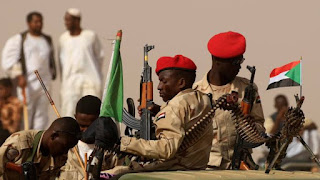NOTE from Sudan Watch Editor: Further to the ICC Prosecutor's two statements on Darfur, Sudan (see below) given to the UN Security Council at a meeting of the Council held in New York on Monday 17 January 2022, here below, for easy reference, is a copy of Resolution 1593 (2005) adopted by the Council at its meeting on 31 March 2005.
Links to a copy of the document in downloadable pdf format and available in several languages can be found at the end of this post. I have used yellow to highlight para 8 referenced in the Prosecutor's 34th report dated 17 January 2022 and in the Council's Resolution 1593 (2005).
Sudan Watch Wed 19 Jan 2022:
Statement of ICC Prosecutor, Karim A.A. Khan QC, to the United Nations Security Council on the Situation in Darfur, pursuant to Resolution 1593 (2005) https://sudanwatch.blogspot.com/2022/01/statement-of-icc-prosecutor-karim-aa.html
Sudan Watch Thu 20 Jan 2022:
FULL TEXT: ICC 34th report pursuant to para 8 of UNSC resolution 1593 (2005), 17 January 2022 https://sudanwatch.blogspot.com/2022/01/full-text-icc-34th-report-pursuant-to.html
_______________
United Nations
Security Council
Distr.: General 31 March 2005
Resolution 1593 (2005)
Adopted by the Security Council at its 5158th meeting, on 31 March 2005
The Security Council,
Taking note of the report of the International Commission of Inquiry on violations of international humanitarian law and human rights law in Darfur (S/2005/60),
Recalling article 16 of the Rome Statute under which no investigation or prosecution may be commenced or proceeded with by the International Criminal Court for a period of 12 months after a Security Council request to that effect,
Also recalling articles 75 and 79 of the Rome Statute and encouraging States to contribute to the ICC Trust Fund for Victims,
Taking note of the existence of agreements referred to in Article 98-2 of the Rome Statute,
Determining that the situation in Sudan continues to constitute a threat to international peace and security,
Acting under Chapter VII of the Charter of the United Nations,
1. Decides to refer the situation in Darfur since 1 July 2002 to the Prosecutor of the International Criminal Court;
2. Decides that the Government of Sudan and all other parties to the conflict in Darfur, shall cooperate fully with and provide any necessary assistance to the Court and the Prosecutor pursuant to this resolution and, while recognizing that States not party to the Rome Statute have no obligation under the Statute, urges all States and concerned regional and other international organizations to cooperate fully;
3. Invites the Court and the African Union to discuss practical arrangements that will facilitate the work of the Prosecutor and of the Court, including the possibility of conducting proceedings in the region, which would contribute to regional efforts in the fight against impunity;
4. Also encourages the Court, as appropriate and in accordance with the Rome Statute, to support international cooperation with domestic efforts to promote the rule of law, protect human rights and combat impunity in Darfur;
5. Also emphasizes the need to promote healing and reconciliation and encourages in this respect the creation of institutions, involving all sectors of Sudanese society, such as truth and/or reconciliation commissions, in order to complement judicial processes and thereby reinforce the efforts to restore long- lasting peace, with African Union and international support as necessary;
6. Decides that nationals, current or former officials or personnel from a contributing State outside Sudan which is not a party to the Rome Statute of the International Criminal Court shall be subject to the exclusive jurisdiction of that contributing State for all alleged acts or omissions arising out of or related to operations in Sudan established or authorized by the Council or the African Union, unless such exclusive jurisdiction has been expressly waived by that contributing State;
7. Recognizes that none of the expenses incurred in connection with the referral including expenses related to investigations or prosecutions in connection with that referral, shall be borne by the United Nations and that such costs shall be borne by the parties to the Rome Statute and those States that wish to contribute voluntarily;
8. Invites the Prosecutor to address the Council within three months of the date of adoption of this resolution and every six months thereafter on actions taken pursuant to this resolution;
9. Decides to remain seized of the matter.
_______________
Source: United Nations.org
View the original document in downloadable pdf format here:
English
https://documents-dds-ny.un.org/doc/UNDOC/GEN/N05/292/73/PDF/N0529273.pdf
Arabic
https://documents-dds-ny.un.org/doc/UNDOC/GEN/N05/292/71/PDF/N0529271.pdf
中文
https://documents-dds-ny.un.org/doc/UNDOC/GEN/N05/292/72/PDF/N0529272.pdf
Francais
https://documents-dds-ny.un.org/doc/UNDOC/GEN/N05/292/74/PDF/N0529274.pdf
Русский
https://documents-dds-ny.un.org/doc/UNDOC/GEN/N05/292/75/PDF/N0529275.pdf
Espanol
https://documents-dds-ny.un.org/doc/UNDOC/GEN/N05/292/76/PDF/N0529276.pdf










